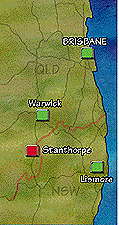Flanders Poppies
Among all of the flowers that evoke a memory or emotion, the red Flanders poppy (Papaver rhoeas) ranks highly. This is the poppy which speaks of World War I as its red flowers carpeted the fields disturbed during battles especially in Flanders. The poppies sprang up in bomb craters, around trenches and often marked soldiers’ graves.
Before it became known as the Flanders poppy because of its association with the battle fields, it was more usually called the corn poppy as it is a weed of disturbed land such as corn fields.
Memorial celebration
Today the red Flanders poppy remains a symbol of the war and its fallen heroes. Diggers, their families and others remember the sacrifices of war by wearing this symbolic flower on their jackets (often a paper poppy), especially on Armistice Day.
A community in Queensland is helping others to remember by holding what is being called the Legacy Flanders Poppy Festival of Faith. The inaugural festival is being held on the 8 November, the Saturday before Armistice Day.
Background
Fay Helwig is the festival’s driving force. She first became interested in the battle fields of France when she and her husband Eberhard moved into the Stanthorpe area five years ago.
In the Stanthorpe district, which is in south-east Queensland in what is called the Granite Belt, seven areas were named after French and Belgian battlefields of WWI. The names of Amiens, Messines, Bapaume, Passchendaele, Bullecourt, Pozieres and Fleurbaix were given to railway sidings in this region as it was one of the places to which returned soldiers and their families were sent to begin a new life. The men were given land grants on which to establish farms and were known as soldier-settlers.
Today the names mark a back road that stretches from Stanthorpe to Cottonvale. The name Passchendaele is also given to the Passchendaele State Forest.
Upon realising the connection between her district and Flanders, and realising from her own garden how well Flanders poppies grew, Fay proposed that a memorial drive planted with the vibrant red poppies be established along the road through the old soldier settlements. Her idea however was vetoed by local farmers concerned that if it was introduced on a large scale the poppy could become a weed in their crops as it has come in the European grain fields.
The decision was made not to plant any of the poppies along the roadsides however the poppies are flowering across Fay’s own garden and in a field she has planted with wheat. Fay’s garden will be the focus for the inaugural Legacy Flanders Poppy Festival of Faith.
Fay’s garden
Besides the Flanders poppies Fay has also planted the northern hemisphere plants that her husband, Eberhard, grew up with as a boy. Their spring garden now features hollyhocks, foxgloves, delphiniums, lupins, forget-me-nots and other old-fashioned cottage plants in a red, white and blue theme.
Fay marvels that no matter where her visitors come from, they all have their different names for the plants, such as the plant we know as heartsease (Viola tricolor). Other names for this little wild pansy include:
- Johnny-Jump-Up
- Love-in-Idleness
- Three Faces Under a Hood
- Tickle My Fancy
- Pink of My John
- Cupid’s Flower
- Stiefmutterchem (Little Stepmother)
As well as the plants there are assorted animals, including two tawny frog-mouth owls, which have made the gum trees by the house their home. The orchard and vegetable garden are tended using organic gardening practices and the produce supplies the tables of the home and attached guesthouse (see details below).
The Helwigs have planted a field with wheat, red poppies and cornflowers which are timed for their peak around 11 November. This is their Remembrance Field and it represents French fields before the devastation caused by war.
Poppy details
Although available Flanders poppies are not a common sight in Australian gardens. They are a hardy annual which prefer a drier climate but are worth a try anywhere. In hotter or colder districts however flowering time may not coincide with Armistice Day.
Common name: Flanders or corn poppy
Botanical name: Papaver rhoeas
Description: Single red poppy with a black centre blotch. Grows to 50 cm tall. This plant is an annual which grows each year from seed.
Likes:
full sun well drained soil
Uses:
wildflower meadow cut flower massed planting
Availability
1. Seeds. Flanders poppies are available around February or March in the Yates packet seed range which is sold through garden centres (packets retail for $1.50 each).
For those who wish to buy mail-order seeds, Digger’s Club seeds also stocks Flanders poppies and can be contacted at:
105 La Trobe Parade
Dromana Victoria 3936
Phone: (03) 5987 1877. Fax: (03) 5981 4298
Email: [email protected]
To order ask for a copy of their newsletter or order seeds directly. The poppies cost $3.50 per packet (covers 10 square metres) or $15 for a packet to cover 100 square metres. Add $2.50 for postage.
2. Seedlings. Seedlings, sold as ‘Gallipoli’, are available in early autumn from most garden centres.
Further information
1. Open garden and festival: The inaugural Legacy Flanders Poppy Festival of Faith will be held on Saturday 8 November. The garden of Das Helwig Haus at Mount Stirling Road, Glen Aplin (near Stanthorpe) is the focus for the festival. For more information on the festival contact Fay Helwig. Phone: (07) 4683 4227.
The garden will also be open on 8 and 9 November through the Australian Open Garden Scheme with the proceeds going to Legacy. For details on the garden opening contact the open line. Phone: 1900 155 064.
2. Accommodation: Das Helwig Haus has guest accommodation. There are three double bedrooms and one twin bedroom, all with private facilities.
Rates: Dinner/Bed/Breakfast rates for Friday and Saturday nights is $85 per person. Dinner/Bed/Breakfast midweek (Tuesday, Wednesday or Thursday nights) is $70 per person.
Bookings: PO Box 86, Glen Aplin, QLD, 4381. Phone: (07) 4683 4227.



